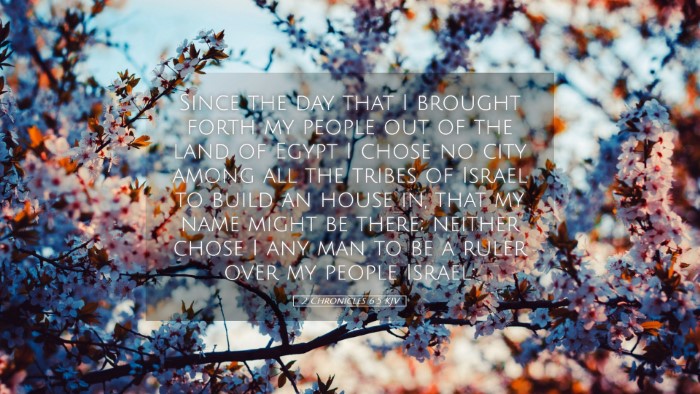Commentary on 2 Chronicles 6:5
Verse: "Since the day that I brought forth my people out of the land of Egypt, I chose no city among all the tribes of Israel to build a house in, that my name might be there; neither chose I any man to be a ruler over my people Israel."
Introduction
In this pivotal verse from 2 Chronicles 6, Solomon addresses the assembly during the dedication of the Temple, emphasizing God's sovereignty in choosing a dwelling place among His people.
This commentary synthesizes insights from several public domain commentaries, providing a rich theological reflection for pastors, students, and scholars.
The Context of Solomon’s Speech
Solomon stands in the context of dedicating the temple, a monumental event signifying God's abiding presence among His people. The speaker acknowledges God's past actions and His sovereign choices regarding Israel’s history.
Matthew Henry notes this historical approach forms a framework that demonstrates God’s providential guidance over Israel from Egypt to this pivotal moment.
God’s Choice from Egypt to the Present
The phrase "Since the day that I brought forth my people out of the land of Egypt" underscores the Exodus narrative as foundational to God’s identity and relationship with Israel.
Albert Barnes emphasizes that God had not chosen a particular location or human leader until the establishment of the Temple, reflecting His direct engagement with the people.
This indicates that God's guidance was not limited to earthly tabernacles or human authorities but was freely chosen according to divine wisdom.
Significance of Divine Choice
- Divine Sovereignty: God’s choice demonstrates His authority; He is not bound by human wisdom or traditions.
- Symbolism of the Temple: The Temple serves as a symbol of God’s presence rather than a literal geographical location; it highlights His desire to dwell among the people.
- Historical Recognition: Solomon's acknowledgment of past events establishes a continuity of God’s plan in history, inviting Israel to understand their identity as a chosen people.
Reflection on Leadership
The lack of choice for a ruler also invites reflection on divine leadership. Adam Clarke argues that appointing rulers is a significant theme throughout scripture. Solomon's statement indicates that divine kingship precedes human governance.
This is a reminder to contemporary leaders that their authority is granted by God and is to be exercised in accordance with His will.
Lessons for Pastors and Theologians
- Understand Divine Authority: Leadership in the church must reflect God's sovereignty, emphasizing humility and reliance on His guidance.
- People’s Role: Congregational identity is rooted in remembering God’s past faithfulness, promoting unity and purpose.
- Building a Spiritual House: The modern emphasis on building the church must reflect the principles laid out in scripture, prioritizing God’s presence over human plans.
Theological Implications
Solomon’s declaration connects to broader theological themes throughout Scripture, including God's choice of Israel, His presence among His people, and the eventual revelation of Christ as the ultimate Temple.
Matthew Henry points out that the text serves as a precursor to understanding Jesus as God's chosen dwelling place. The temple in Jerusalem points forward to Christ Himself, as stated in John 1:14, where “the Word became flesh and dwelt among us.”
Conclusions for Contemporary Worship
- God’s Presence: Worship should focus on experiencing God's presence rather than the physicality of a place.
- Unity in Christ: The shared identity gathered in worship reflects the collective understanding that all believers are part of Christ's body, transcending geographical and cultural boundaries.
- Anticipation of Fulfillment: Understanding the Temple's significance sets the expectation for the second coming where God’s dwelling will be fully realized in heaven.
Conclusion
2 Chronicles 6:5 is a profound reminder of God’s sovereign choices throughout Israel's history and the relationship with His people.
Pastors, students, and theologians alike can draw meaningful implications from Solomon's words about leadership, worship, and the continual presence of God among His people.
In the act of dedicating the Temple, Solomon encourages believers to honor God's choices, fostering a community that is aware of its divine heritage and calling.


